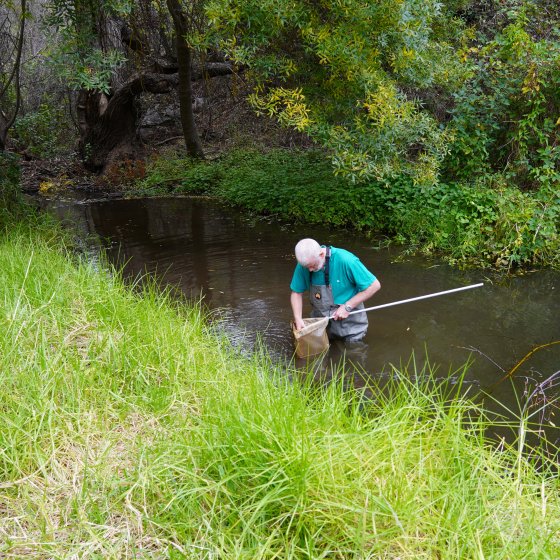- Home
- Environmental Themes
- Waters
- Monitoring and Reporting
Monitoring and Reporting
We monitor the health of our waters to understand what impacts we may be having on the condition of our waters and how we can best respond to address these impacts.
In South Australia, water is managed and monitored by a number of different agencies. This includes for natural environments (surface water and groundwater), drinking water, water used for other purposes (for example, irrigation), wastewater and stormwater.
EPA
- Aquatic Ecosystem Condition Reporting monitors South Australia’s inland surface waters to assess their environmental condition, based on a descriptive model for interpreting change in ecological condition in relation to levels of human disturbance. Monitoring data is used to produce aquatic ecosystem condition reports that provide information on the location and special features of waterways and findings of assessments, and identify pressures and management responses. The reports rate aquatic ecosystems on a six-point scale, ranging from ‘very poor’ to ‘excellent’.
- Assessment, reporting and remediation of groundwater contamination to ensure the protection of human health and the environment.
DEW
- Water resource assessments for groundwater and surface water are undertaken by DEW. These assessments measure groundwater level, salinity, water extraction and stream flows across the state.
Landscape Boards
- Landscape Boards are involved in the management, monitoring and reporting of the health of water resources and aquatic ecosystems within their region.
PIRSA/SARDI
- The department conducts applied research on inland waters and catchment ecology to inform scientific and technical advice provided to government, industry and the community.
SA Health
- The Department ensures that safe drinking water is supplied to consumers under the Safe Drinking Water Act 2011.
SA Water
- The agency monitors the quality and use of drinking water sources, which includes the River Murray, reservoirs and groundwater, and aims to implement sustainable management practices for their operations. SA Water is required to monitor the quality of discharge waters and potential impacts to the environment via their EPA licence for wastewater treatment and desalination plants.
National Pollutant Inventory
- The NPI requires industry to report on their emissions to waters. The NPI is an online database published by the Australian Government (Department of Climate Change, Energy, the Environment and Water) containing information on the types and quantities of pollutants being emitted from a range of industrial, commercial, transport and household activities. In South Australia, NPI data comes from a combination of EPA licensed and non-licensed facilities. A business may need to report to the NPI even if it is not licensed by the EPA.
Other agencies
- Monitoring and reporting on our waters is also undertaken by other stakeholders, sometimes in partnership with government agencies. These stakeholders include:
- citizen science
- monitoring undertaken by industry.
- Research on inland waters is also carried out by several other organisations in South Australia:
- the Goyder Institute for Water Research carries out research on solutions to complex water management challenges.
- South Australian universities undertake research on inland waters, for example:
- Flinders University hosts the National Centre for Groundwater Research and Training, which aims to increase our understanding of groundwater resources
- the Environment Institute at the University of Adelaide carries out research into water quality and freshwater ecosystems
- the Sustainable Infrastructure and Resource Management facility at UniSA carries out research on water in its Natural Resources and Environmental Resilience programs.
